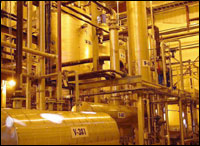Dear Umbra,
What is thermal depolymerization?
Ann
Freehold, N.J.
Dearest Ann,
A polymer is a large group of linked molecules. We’re made of polymers such as protein, eat polymers such as starch, and wear polymers such as leather and nylon. Thermal depolymerization is a heat-driven process that breaks down or transforms polymers into the shorter chains from whence they came: oil. Our planet’s automatic transformation of dead dinosaurs and dead cavepeople and other organic matter into petroleum is thermal depolymerization — the slow conversion of our ancestors into Dodge Caravan fuel.

Turning turkey into black gold.
Photo: Changing World Technologies.
People who understand science better than you and I are investigating the possibility of artificially speeding up the thermal depolymerization process to take advantage of our waste products and add to the oil supply. One company, Changing World Technologies, is currently refining the process of refining giant food conglomerate ConAgra’s turkey offal into refined oil in a Missouri plant. Changing World churns up turkey leftovers, subjects them to high heat, and decants crude oil in far less time than Mother Earth takes to accomplish the same trick. Or at least that’s the idea; all this is still under development. Other parties have experimented with swine waste, but in any case, you get the picture; the hope is to transform waste into oil.
To get to what I suspect is the heart of your rather succinct question: Alternative-fuel folks are keeping close tabs on the evolution of this process, which may someday provide one solution to our many waste and fuel problems. Or maybe not. Past attempts to speed up this side of nature have proven too energy intensive to be practical. The folks at CWT and other scientists working with swine waste think they’ve found a better technique that leverages water, heat, and pressure in an economical and efficient combination. Interested observers, including yourself, are eagerly waiting to see if their successes can be reproduced on a larger scale.
Monomerly,
Umbra

